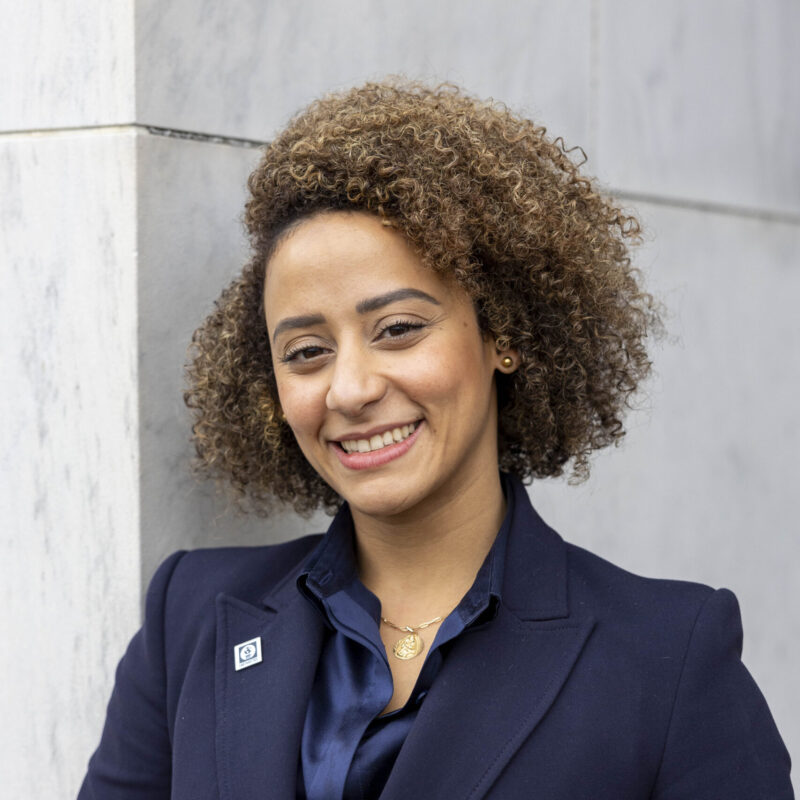Meet Yaheiry Mora: Earthjustice Action’s New Political Director
 Activist and advocate Yaheiry Mora brings over a decade of experience grounded in the labor and immigrant rights movement to Earthjustice Action. As the Founding Director of CASA in Action, the largest Immigrant Rights organization in the Mid-Atlantic region, she built CASA in Action’s electioneering and PAC infrastructure from the ground up while leading the organization’s electoral expansion from one to three states. Starting in 2020, she worked with grassroots groups in Wisconsin to develop organizing and voter engagement strategies that activated and mobilized Black and Latino voters in consequential elections, including the Wisconsin State Supreme Court election that ultimately flipped the state supreme court after 15 years of conservative control.
Activist and advocate Yaheiry Mora brings over a decade of experience grounded in the labor and immigrant rights movement to Earthjustice Action. As the Founding Director of CASA in Action, the largest Immigrant Rights organization in the Mid-Atlantic region, she built CASA in Action’s electioneering and PAC infrastructure from the ground up while leading the organization’s electoral expansion from one to three states. Starting in 2020, she worked with grassroots groups in Wisconsin to develop organizing and voter engagement strategies that activated and mobilized Black and Latino voters in consequential elections, including the Wisconsin State Supreme Court election that ultimately flipped the state supreme court after 15 years of conservative control.
You’ve spent over a decade working in organizing, issue advocacy, and voter engagement work. What brings you to Earthjustice Action and the environmental movement at this particular time?
I grew up in the Dominican Republic, so I am no stranger to the impacts of climate change and its disproportionate effects on communities of color and low-income communities. I also grew up in a very low-income neighborhood in Santo Domingo Este, near an industrial area where we were exposed to various pollutants that exacerbated my childhood asthma. In addition to poor air quality, we dealt with severe water scarcity. We often had to walk long distances for clean water because our house did not have running water. These experiences taught me to see environmental justice as not only a civil rights issue, but a human rights and social justice issue. It is about who has access to clean air and water and who does not. Earthjustice Action is consistently working to fight the polluting industries that put their greed over the health and well-being of people. After working for years in labor organizing, voting rights, and immigrant rights, Earthjustice Action’s environmental work is a natural fit.
How has your own identity inspired your activism and career path? How does that intersect with your work with Earthjustice Action?
It was impactful to learn about Earthjustice, the 501(c)(3) sister organization of Earthjustice Action, and its incredible work representing impacted people—oftentimes from vulnerable, underrepresented communities like Indigenous communities, low-income communities, and communities of color that are much more likely to experience environmental injustice. While I grew up experiencing environmental injustices each day, I never knew to call them that. It wasn’t until later in my life that I realized how interconnected those issues were to other systemic racial and class injustices. I believe that experience is common among many people of color in the environmental movement. Whether fighting for immigrant rights, housing rights, education, or other struggles, we’ve also simultaneously, and sometimes unknowingly, fought for environmental justice. We’ve always been in this fight. My identity as an immigrant, as an Afro Latina, and someone who directly experienced environmental injustice is fundamental to who I am and has impacted my work to level the playing field and ensure that our communities can thrive.
Earthjustice Action is all about informing others on the critical connection between the courts and the environment. How do you view the courts and the environment as interrelated?
This is a critical strength of Earthjustice Action because that connection isn’t obvious to many people. The judiciary is not where we immediately go when we think about the environment, but we can’t protect clean air, water, and wild spaces without it. Environmental protections are grounded in enforcement, and the courts have the unique ability to uphold them and protect everyday people from environmental injustices. This is the work ahead of us, ensuring we communicate the importance of our courts—not just for upholding and enforcing environmental laws—but for protecting all our rights. Whether it’s reproductive rights, worker’s rights, LGBTQ rights, or the right to breathe clean air and drink clean water, this all depends on fair judges and fair courts that will uphold the rule of law. It’s all interconnected.
What are you most excited about this upcoming year with Earthjustice Action?
A lot of things! First, it is an election year that is perhaps one of the most consequential in our history. On the Earthjustice Action side of things, there’s a great need for more voter education to connect the role the courts play in environmental justice and why voters should care. In recent years, we’ve become more and more aware of the impact judges have in protecting our rights when it comes to issues like reproductive rights, but the environmental connection is also critically important. Earthjustice Action is a growing organization with solid issue expertise and strong advocacy capacity, and this year provides a great opportunity to communicate to voters who we are. It’s an opportunity to let them know that we’re fighting alongside them in a collective struggle. It’s also an opportunity to educate voters on the importance of down-ballot elections and their role in environmental issues. This includes education and mobilization on seemingly small races with major implications, like state supreme court races. While more voters are paying attention and more organizations like Earthjustice Action are getting involved, we still have much to do. The power of the courts doesn’t stop at the top of the ticket with the Supreme Court, but is distributed across the ballot. We have an obligation to help voters understand that.